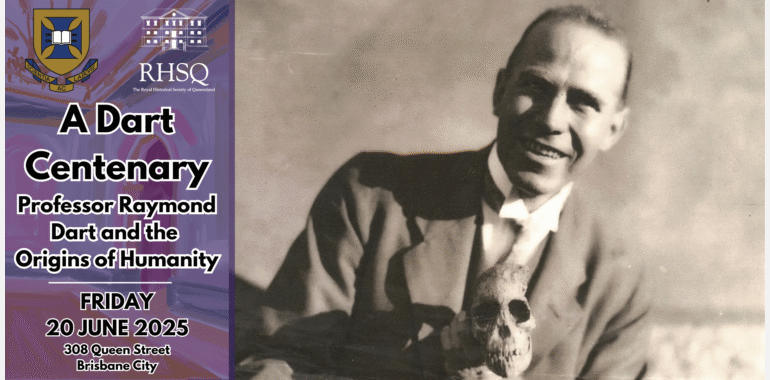- - 308 Queen Street, Brisbane City
- 20th June 2025 - 20th June 2025
- 8:30 am - 3:00 pm
- https://raymonddartcentenary.eventbrite.com.au
- info@queenslandhistory.org.au
- $30
A Dart Centenary – Professor Raymond Dart & the Origins of Humanity
About:
Join us for a day of academic talks focused on the life of Professor Raymond Dart, discoverer of the species of pre-homo Australopithecus africanus. In 1925, he published his findings in Nature on the Taung Child, uncovered in South Africa. His article was groundbreaking and a huge leap forward in our collective understanding of the origins of humanity.
Programme:
8:30am 🔹 Registration
9:00am 🔹 Welcome by Prof. Michael Westaway
9:15am 🔹 “Raymond Dart – of Brisbane and the World” by Prof. John Pearn
9:45am 🔹 Keynote Address – “Raymond Dart and Taung – A Personal Memoir of His Paradigm Shift on Human Evolution” by Em. Prof. Laurence Geffen
10:30am 🔹 MORNING TEA
11:00am 🔹 Keynote Address – “Raymond Dart – the Taung Discovery and its Implications” by Prof. Michael Westaway
11:35am 🔹 “Raymond Dart – Schooling and University Alumnus” by Simon Farley Esq.
11:55am 🔹 Keynote Address – “Human Origins – A Century Perspective of the Discovery of Taung” by Prof. Jackson Njau
12.30pm 🔹 LUNCH
1.30pm 🔹 “Stone Tools – Australopithecus and early Homo” by Prof. Mark Collard (TBC)
2.00pm 🔹 “The Osteodentokeratic Culture and Taphonomy” by Assoc. Prof. Tiina Manne
2.30pm 🔹 “The Dart Legacy” by Prof. John Pearn
3.00pm 🔹 CLOSE
Further Information:
In February 1925, the scientific journal Nature published Professor Raymond Dart’s paper titled ‘Australopithecus africanus — the ape-man from South Africa’. In 1984, the popular Journal, Science 84, included Dart’s paper as one of the “20 Discoveries That Changed Our Lives”. The authors included Dart’s work with other scientific discoveries which included nuclear fission and the discovery of DNA, the computer and the contraceptive pill.
It was said that Dart’s discovery had: ‘ … a significant impact on the way we live and the way we think about ourselves’.
Two decades later, in December 2003, the publishers of Nature published a book titled A Century of Nature: 21 Discoveries That Change Science and the World; and included Dart’s discovery of Australopithecus africanus as Chapter One in a series which included, inter alii, the first laser, Dolly the sheep (the creation of viable offspring from fetal mammalian cells) and the discovery of continental drift. By 2009, it was written that ‘The story of the discovery of the Taung skull [of Australopithecus africanus] is well known and is now part of the history, even the folklore, of studies of early man’.
Of equal import to the professions of anthropology and archaeology, Dart’s discovery was also to have a profound influence in other domains, including those of philosophy and theology.
Following the publication of his paper in Nature, Dart was immediately confronted with two challenges — one scientific and one personal. The scientific confrontation in turn included two distinct themes. One was his proposal that hominid ancestors derived from Africa, and not from Europe or Asia . The other was a professional challenge that Dart did not have the experience or technical gravitas, and certainly not a background in anthropology or archaeology, to make the evolutionary claims that he proposed; and therefore, that his interpretations were, at best, doubtful. Much has been written about the 20-year controversy which followed the publication of his Nature paper. It transpired that Dart was correct.
Raymond Dart was born in Toowong, in Brisbane at the height of the 1893 flood. His family had owned the land at St Lucia on which the University of Queensland stands today. He studied at the Toowong State School and at the Ipswich Grammar School; and was the first Honours graduate at the newly-established University of Queensland . In the centenary year of Dart’s seminal paper, the University of Queensland and the Royal Historical Society of Queensland is hosting a Dart Centenary Seminar at which world authorities on archaeology, anthropology and history will be speaking — on Friday, 20 June 2025 at the UQ Centre, 308 Queen Street, Brisbane . All are welcome at this special event.
